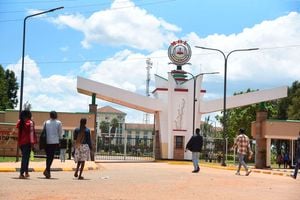
Lawyer Abdikadir Mohamed.
They were meant to drastically reduce the Sh200 billion annual wage bill of parastatals, but the reforms of State corporations by both President Uhuru Kenyatta and his successor William Ruto have fallen woefully short of what was promised.
This is according to Abdikadir Mohamed, the co-chairman of the Presidential Taskforce on Parastatals and one of the brains behind the push to reform the State corporations.
Mr Mohamed, a former senior adviser in the President's office, and former Commercial Bank of Africa Managing Director Isaac Awuondo co-chaired the task force set up by former President Uhuru Kenyatta.
Now, he has castigated successive regimes since 2013 for failing to implement his report, which he says could have tackled waste in the institutions.
Mr Mohamed's comments on Wednesday came against the backdrop of a Cabinet decision on Tuesday to dissolve nine State-owned entities, merge 42 more to form 21, and 16 earmarked for either dissolution or divestiture as their mandates can be done by the private sector.
The move at the Cabinet meeting chaired by President Ruto in Kakamega drew parallels with the Mohamed Awuondo-led Mwongozo Code of Governance for State Corporations, which has been gathering dust on shelves for the past 12 years.
Mwongozo was a product of the Presidential Task Force on Parastatal Reforms, launched by former President Kenyatta in 2013.
The current reforms, based on the Mwongozo code, aim to promote transparency, reduce wastage and improve service delivery in government parastatals.
On Wednesday, Mr Mohamed lamented that Mwongozo hadn't been implemented despite its far-reaching recommendations that would have drastically reduced the Sh200 billion annual wage bill of state enterprises at the time.
"It was unfortunate that Mwongozo wasn't implemented. But we say better late than never. However, the problem is massive and merging 42 corporations into 20 is a good start," Mr Mohamed told the Nation.
He went on: "We did our report with Isaac Awuondo in 2013, which is 12 years ago. Twelve years late is not a good start, but at least something has moved and the reforms are very necessary because these corporations are very wasteful due to a lot of duplication and wastage of resources."
He said their report recommended doing away with at least 30 percent of the state corporations to reduce the annual Sh200 billion wage bill.
The proposed radical reforms, which were expected to save taxpayers billions of shillings, were launched by President Kenyatta in July 2013 with the appointment of the 10-member team.
Little has been heard of the effort since, but policy documents seen by Nation.Africa shows that board members serving in state enterprises at the time were not expected to stay beyond three months after the new laws were enacted if they did not meet the new stringent qualifications.
Chief executives of the parastatals to be merged would serve as heads of directorates in the new entities for a maximum of six months, after which exit packages would be prepared for those whose terms had not expired.
As a result, staff would be absorbed into these new directorates.
On Tuesday, in a move that echoed earlier plans 12 years ago, the Cabinet approved plans to merge or dissolve several state-owned enterprises as part of a budget support programme Kenya has with the International Monetary Fund (IMF).
In a Cabinet Dispatch released on Tuesday evening, the Cabinet noted that nine state enterprises will be dissolved, 42 merged and another six restructured in a far-reaching plan reminiscent of the 1990s structural adjustment programmes (SAPs) pushed by the IMF and its Bretton Woods sister institution, the World Bank.
Thousands of jobs were lost in the implementation of the SAPs as dozens of state enterprises were either privatised or dissolved.
But State House spokesman Hussein Mohamed, in a swift rebuttal to the Cabinet statement, said all affected civil servants would be redeployed within the civil service, allaying fears of mass redundancies but also casting doubt on the extent of the expected cost savings.
"No function of the state corporation will be lost and no jobs will be lost as all affected employees will be absorbed into the civil service," Mr Mohamed said in a statement to Nation.Africa.
"This is in line with the commitment to streamline government operations and optimise resource utilisation as part of the ongoing government restructuring aimed at minimising waste and curbing excesses," he added.
Another State House source told the Nation Wednesday evening that the Public Service Commission (PSC) will be tasked with ensuring redeployment to stem job losses.
This followed a warning from the Union of Kenya Civil Servants (UKCS) secretary-general Tom Odege, who cautioned against any retrenchment.
"If it's done in good faith, it's fine. We expect staff to be deployed in their respective ministries and not retrenchment," warned Mr Odege, who is also Nyatike MP.
Under the Jubilee administration, the government intended to merge some of the corporations or transfer some functions of the state corporations to the counties, eventually reducing their number from 262 to 187.
The state enterprises would be governed by a new business-oriented code of conduct called Mwongozo.
"We need to implement Mwongozo to increase efficiency and accountability in the use and deployment of scarce public resources," President Kenyatta said in 2013.










